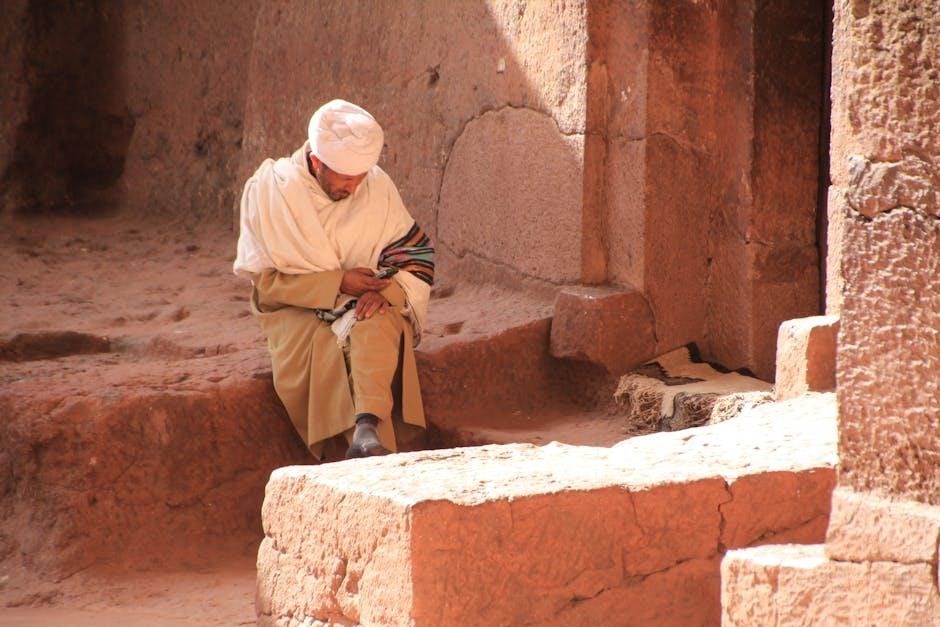The Ethiopian Orthodox Fasting Calendar 2024 is a vital spiritual guide, outlining approximately 250 fasting days․ It structures the liturgical year, blending tradition with modern accessibility, ensuring a balanced approach to faith and health․
Historical Background
The Ethiopian Orthodox fasting calendar traces its roots to ancient Christian traditions, deeply influenced by the practices of the early Church Fathers․ The Geez lunisolar calendar, upon which it is based, reflects a unique blend of biblical and cultural heritage․ Fasting has historically served as a cornerstone of Ethiopian Orthodox spirituality, with practices dating back to the Apostolic era․ The tradition emphasizes prayer, charity, and self-denial, aligning with the teachings of Christ and the Apostles․ Over centuries, the calendar has been refined, incorporating elements from Coptic and Judeo-Christian rituals․ Today, it remains a vital part of the Ethiopian Orthodox identity, guiding believers through periods of spiritual preparation and commemoration․ Its enduring relevance underscores the faith’s rich historical legacy․
Structure of the Calendar
The Ethiopian Orthodox fasting calendar is structured around a lunisolar system, blending solar cycles with lunar phases․ It includes major fasts like Great Lent, the Nativity Fast, and the Apostles’ Fast, each with specific durations and spiritual objectives․ The calendar also incorporates mid-week fasts on Wednesdays and Fridays, emphasizing regular spiritual discipline․ These periods are interspersed with feasts and holy days, creating a balanced rhythm of fasting and celebration․ The structure is designed to guide believers through seasons of reflection, purification, and joy, aligning their spiritual journey with the life of Christ and the Church․ This harmonious blend of fasting and feasting fosters a holistic approach to faith, enriching the spiritual lives of adherents throughout the year․

Key Dates and Periods in the 2024 Fasting Calendar
Ethiopian Orthodox 2024 fasting calendar highlights key periods: Great Lent (March-May), Nativity Fast (November-December), and Apostles’ Fast (variable dates)․ Mid-week fasts on Wednesdays and Fridays․
Great Lent
Great Lent, or Abye Tsome, is the most significant fasting period in the Ethiopian Orthodox tradition, lasting 55 days․ It begins on March 18, 2024, and culminates on April 13, 2024․ This period commemorates Christ’s 40-day fasting in the wilderness and is a time of profound spiritual preparation for Easter․ Observants abstain from meat, dairy, and oil, with stricter adherence as Easter approaches․ The fast includes Tsome Himamat, a 7-day intensification preceding Holy Week․ Great Lent emphasizes prayer, repentance, and charity, culminating in the joyous celebration of Christ’s Resurrection․ This period is central to the Ethiopian Orthodox faith, fostering spiritual renewal and deepening devotion․
Nativity Fast
The Nativity Fast, also known as the Advent Fast, is a 40-day period of spiritual preparation for the birth of Christ․ It begins on November 25, 2024, and concludes on January 6, 2025․ This fast emphasizes prayer, fasting, and acts of charity, mirroring the Great Lent in structure but with less intensity․ Observants abstain from meat, dairy, and other rich foods, though specific practices may vary․ The fast serves to purify the soul and deepen devotion, culminating in the joyful celebration of Christmas․ It is a time of reflection and anticipation, fostering a closer connection to the divine and the true meaning of Christ’s birth․ Health considerations and spiritual guidance may allow for adjustments in observance․
Apostles’ Fast
The Apostles’ Fast is a significant period in the Ethiopian Orthodox tradition, typically occurring after Pentecost․ In 2024, it is expected to begin shortly after the celebration of Pentecost, with its exact duration varying based on the lunar calendar․ This fast honors the missionary journeys and preaching of the Apostles, emphasizing spiritual reflection and discipline․ Observants may abstain from certain foods, focusing on prayer and acts of charity․ The fast’s length can vary, making it a flexible yet meaningful period for spiritual growth․ Health considerations allow for individual adaptations, ensuring the fast remains accessible while maintaining its profound spiritual significance․
Mid-Week Fasts
Mid-Week Fasts in the Ethiopian Orthodox tradition include Wednesdays and Fridays, observed throughout the year except during specified periods like Paschaltide․ These fasts encourage regular spiritual discipline and self-reflection․ They are less stringent than major fasts, allowing for flexibility in observance․ The focus is on prayer, abstinence from certain foods, and acts of charity․ Health considerations and personal circumstances may lead to adaptations, ensuring the fasts remain accessible․ Cultural variations also influence practices, with some communities emphasizing specific traditions․ These mid-week fasts serve as reminders of the ongoing commitment to spiritual growth and faith, integrating discipline into daily life while accommodating individual needs and cultural diversity․

The Significance of Fasting in the Ethiopian Orthodox Tradition
Fasting is a cornerstone of Ethiopian Orthodox spirituality, fostering spiritual purification, self-reflection, and unity among believers․ It strengthens faith, commemorates sacred events, and nurtures a deeper connection with God․
Spiritual Purification
Fasting in the Ethiopian Orthodox Tradition is a profound means of spiritual purification, enabling believers to draw closer to God․ By abstaining from worldly desires, followers focus on prayer, repentance, and self-reflection․ This practice cleanses the soul, fostering humility and inner peace․ The rigorous fasting periods, such as Great Lent, emphasize spiritual renewal, mirroring Christ’s 40-day fast in the wilderness․ Through this discipline, individuals seek to overcome sinful tendencies, strengthen their faith, and attain a deeper connection with the divine․ The calendar’s structure ensures a balanced rhythm of fasting and feasting, guiding believers toward continuous spiritual growth and a life rooted in holiness․
Commemoration of Religious Events
The Ethiopian Orthodox Fasting Calendar 2024 is deeply intertwined with the commemoration of significant religious events․ Fasting periods such as Great Lent, the Nativity Fast, and the Apostles’ Fast are rooted in the lives of Christ, the Virgin Mary, and the Apostles․ These observances allow believers to reflect on pivotal moments in Christian history, fostering a connection to the divine․ By fasting, the faithful honor the sacrifices and teachings of religious figures, drawing spiritual strength from their examples․ The calendar ensures that these events remain central to the liturgical year, guiding followers in their devotion and remembrance of sacred traditions․

Obtaining the 2024 Ethiopian Orthodox Fasting Calendar in PDF
The 2024 Ethiopian Orthodox Fasting Calendar is easily accessible in PDF format online․ Official church websites and trusted religious platforms offer free downloads, ensuring convenient spiritual planning․
Online Resources
Accessing the 2024 Ethiopian Orthodox Fasting Calendar in PDF is straightforward through various online platforms․ Official church websites, such as the Ethiopian Orthodox Tewahedo Church’s official site, offer downloadable versions․ Additionally, trusted religious portals and cultural hubs provide free PDFs, ensuring widespread availability․ These resources often include detailed fasting guidelines, feast days, and historical context, making them invaluable for spiritual planning․
Independent websites and blogs dedicated to Orthodox Christianity also offer printable calendars․ Some platforms feature digital planners with integrated fasting schedules, while others provide tools to convert dates between the Ethiopian and Gregorian calendars․ Ensuring the source is credible is crucial for accuracy․ Parish websites and religious forums often share reliable links, catering to both local and global communities seeking to observe the fasting traditions faithfully․
Ensuring Authenticity
Obtaining an authentic 2024 Ethiopian Orthodox Fasting Calendar in PDF requires verifying the source’s credibility․ Official church websites, such as the Ethiopian Orthodox Tewahedo Church’s portal, are the most reliable sources․ Look for endorsements from recognized religious institutions to ensure the calendar aligns with traditional practices․ Additionally, cross-referencing the document with trusted religious leaders or community elders can help confirm its accuracy․ Be cautious of unofficial websites that may alter or misrepresent fasting guidelines․ The calendar should reflect the Ge’ez lunisolar system and include approximately 250 fasting days, as per the tradition․ Always prioritize sources with clear affiliations to the Ethiopian Orthodox Church to avoid downloading incorrect or misleading information․

Digital Tools and Apps for Fasting Observance
Digital tools and apps have simplified adherence to the 2024 Ethiopian Orthodox Fasting Calendar․ Apps like “Prayer & Fasting Guide” and “Orthodox Fasting Assistant” provide detailed fasting schedules, prayer timers, and calendar integration․ These platforms allow users to track fasting periods, receive reminders, and access spiritual resources․ Some apps offer customizable alerts for specific fasting days, ensuring users stay informed and aligned with the liturgical cycle․ Additionally, digital calendars can be synced across devices, making it easier to follow the fasting rules regardless of location․ Many apps also include educational content, helping users understand the spiritual significance of fasting․ By leveraging technology, believers can observe fasting with greater convenience and deeper devotion, enhancing their spiritual journey throughout the year․

Exceptions and Dispensations
Exceptions and dispensations in the Ethiopian Orthodox fasting calendar accommodate health needs, cultural practices, and personal circumstances, guided by spiritual leaders to ensure fasting remains․
Health Considerations
Health considerations play a significant role in the Ethiopian Orthodox fasting calendar․ Individuals with medical conditions, the elderly, and those with physical limitations may receive dispensations․ Pregnant women, nursing mothers, and young children are often exempt from strict fasting rules to ensure proper nutrition․ Spiritual leaders guide believers in balancing fasting with health needs, emphasizing that fasting should not harm the body․ Modifications, such as reducing the intensity or duration of fasting, are common․ The Church prioritizes well-being, allowing adjustments to prevent health risks while maintaining the spiritual benefits of fasting․ This compassionate approach ensures fasting remains a meaningful practice for all, regardless of physical condition․
Cultural and Personal Variations
The Ethiopian Orthodox fasting calendar accommodates cultural and personal variations, allowing individuals to adapt practices based on regional traditions and personal circumstances․ Regional customs may influence how fasting is observed, with some communities incorporating unique practices․ Personal variations include adjustments to fasting rules for individuals with distinct lifestyles or health needs․ Spiritual leaders provide guidance, enabling believers to align fasting with their personal spiritual journeys․ This flexibility ensures that fasting remains a meaningful and accessible practice across diverse cultural and personal contexts, fostering a deeper connection to faith while respecting individual differences․

The Role of Spiritual Guidance
Spiritual guidance plays a pivotal role in the observance of the Ethiopian Orthodox fasting calendar․ Priests and church leaders offer counsel tailored to individuals’ needs, ensuring fasting is practiced in harmony with one’s health, lifestyle, and spiritual goals․ This guidance helps believers navigate the calendar’s intricacies, such as exemptions for health reasons or personal circumstances․ By seeking advice, individuals can maintain a balance between spiritual discipline and physical well-being, fostering a deeper understanding of fasting’s purpose․ Spiritual leaders also provide encouragement and support, helping adherents stay committed to their faith journey․ Their wisdom ensures that fasting is a transformative and enriching experience, aligning with the teachings of the Ethiopian Orthodox tradition․
